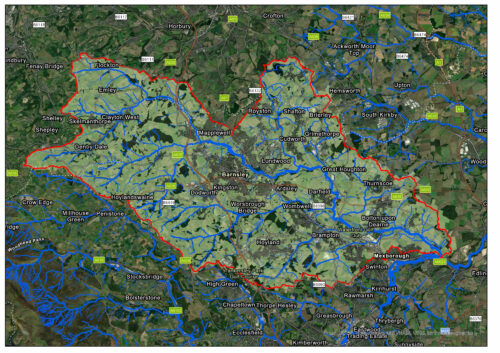Lead: Chris Harrap chris@tyershallfarm.com
Group members: 32
Length of agreement: 2 years
Area of group (Hectares): 6150
Overview:
The area covered by the Dearne Valley Farmers is in the Nottinghamshire, Derbyshire and Yorkshire Coalfield NCA 38.
Formed in May 2022, the cluster group brings farmers together from across the catchment to explore existing and emerging environmental schemes and agro-ecological approaches to deliver bigger, better and more joined up landscape-scale nature recovery. Themes of focus are soil health and resource protection, biodiversity enhancement, regenerative agriculture and natural flood management.
A post-industrial area based on predominantly loamy and clayey soils, the farming systems in the area are diverse and include specialised arable, mixed, dairy and beef. As an urban fringe cluster, spanning the town of Barnsley, farmers face associated opportunities and challenges. Some farmers have diversified and offer educational access visits. From its source near Skelmanthorpe, the River Dearne and its tributaries run through the area. Formerly a Nature Improvement Area, the Dearne has some of the richest wildlife and most vibrant habitats in the Don catchment. In 2021, the Dearne Valley Wetlands were designated as a Site of Special Scientific Interest. It consists of a network of post-industrial restoration sites of wetland, scrub and woodland habitats which support a substantial ornithological interest of breeding and non-breeding ducks, waders and the willow tit.
Soil health and regenerative agriculture: Integrating regenerative agriculture principles into farming systems promises to improve soil health which in turn promotes healthy crops and water; it also encourages better nutrient cycling and a reduced need for artificial inputs and pesticides, further supporting water quality. Some farmer members are already practising #regenag. The recently expanded Catchment Sensitive Farming programme supports farmers in the area to implement a range of resource protection solutions.
Biodiversity priorities: Broadly, farmland birds and pollinators are biodiversity priorities and the project offers each farmer member a free, tailored Countryside Stewardship advice visit from Ann Hanson which has resulted in greater Mid Tier uptake of key biodiversity options. Additionally, the cluster is running a “Hedges & Edges” mini-project in 2022/23. There may be opportunities to provide bigger, better and more joined up habitats for local priority species – wetland birds and willow tit.
Natural flood management: In the wake of the climate emergency, it is recognised that landholdings within the catchment offer the potential to provide flood mitigation solutions through the implementation of natural flood management (NFM) measures at scale. Furthemore, there are often secondary benefits to implementing NFM measures, such as biodiversity enhancement, reducing water pollution and carbon sequestration. Responding to South Yorkshire’s major flooding incident in 2019, the cluster is exploring opportunities to support the work of the Connected by Water South Yorkshire Action Plan.
Carbon: Farmer members have expressed an interest in exploring carbon markets.
Funder: Yorkshire Water. The project is run as a partnership and the delivery partners are Chris Harrap (Tyers Hall Farm) – Farmer Facilitator, Ann Hanson (Yorkshire Farming and Wildlife Partnership) – Advisor Facilitator and Jenny Palmer (Don Catchment Rivers Trust) – Project Officer.
Map: Dearne Catchment area.

